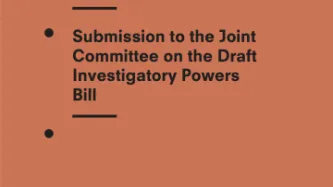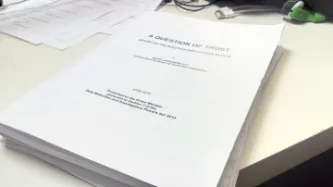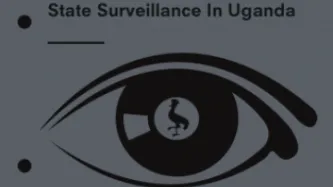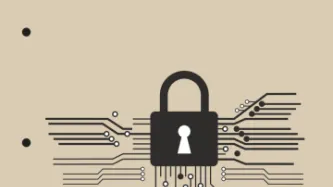Search
Content type: Advocacy
In response to the Government publishing proposed new surveillance powers in November 2015, Privacy International submitted this highly detailed analysis to the Joint Committee on the Draft Investigatory Powers Bill in December. Our report proposes significant changes across the Bill to ensure better privacy protection while still enabling public bodies to have the powers they need.
Content type: Press release
Privacy International welcomes the Committee’s report on the draft Investigatory Powers Bill (IP Bill). The report mirrors what many from across the technology sector and civil society have been saying: the lack of clarity in the draft Bill risks undermining security and privacy.
The Committee encountered almost universal confusion regarding the meaning of “Internet Connection Records” and what the collection of such records would entail. …
Content type: News & Analysis
As we mark the 750th anniversary of the first parliament called in Britain, its time for intelligence agencies to tell the truth.
After the fall of the Berlin wall, the new German government dedicated its commitment to democracy by physically building transparency into the political process - the impressive glass cupola of the Reichstag, the expansive glass walls of the ministry buildings and in the chancellery all encourage public curiosity and…
Content type: News & Analysis
Internet Connection Records are a new form of communications data created by the Investigatory Powers Bill at Parts 3 and 4. They constitute an unlawful interference with privacy with the ability to provide a highly detailed record of the activities of individuals, profiling their internet habits.
Clause 62 of the Investigatory Powers Bill (“IP Bill”) permits a wide range of public authorities to collect Internet Connection Records, however throughout debates on this highly controversial new…
Content type: Press release
This is Privacy International's submission in response to the Science and Technology Committee's call for evidence on the draft Investigatory Powers Bill.
Content type: Press release
A joint statement from international and domestic civil society organisations expresses continued serious concerns regarding the passage of Pakistan’s Prevention of Electronic Crimes Bill. Privacy International, ARTICLE 19, Human Rights Watch, Association for Progressive Communications, Digital Rights Foundation, and other human rights organisations including the Human Rights Commission of Pakistan are calling for the bill currently awaiting debate in the National Assembly to be scrapped and…
Content type: Press release
Privacy International is deeply disturbed by the Moroccan government’s crackdown on media, human rights defenders, and civi society. Our friend Hisham Almiraat will be appearing in court on Thursday November 19th, 2015 along with six other journalists and human rights defenders members, and is facing the charges of “receiving foreign funding without notifying the General Secretariat of the government” and charges of “threatening the internal security of the State”, an offense that can lead…
Content type: News & Analysis
The UK Government introduced a draft surveillance bill on Wednesday – the innocuously named 'Investigatory Powers Bill'. Trumpeted as 'world leading' by the Home Secretary, the only sense in which this is true is that other Governments around the world will now also seek a mandate for mass surveillance and hacking.
Until recently, the idea that a Government agent could hack a mobile phone and turn on its camera and microphone to bug a conversation in a room was the realm of science fiction, or…
Content type: Press release
Privacy International has today written to the Investigatory Powers Tribunal (IPT), the secret court that hears complaints about the UK's surveillance regime, to demand that the Government comes clean about when and how it began collecting bulk communications data in the UK, and just as importantly, who knew of and approved the operation.
Last Wednesday, on the very day that the Government published its draft Investigatory Powers Bill, an era-defining piece of legislation that the Home…
Content type: News & Analysis
On legal reform
"RIPA, obscure since its inception, has been patched up so many times as to make it incomprehensible to all but a tiny band of initiates. A multitude of alternative powers, some of them without statutory safeguards, confuse the picture further. This state of affairs is undemocratic, unnecessary and – in the long run – intolerable." [E.S. 35]
This report is confirmation of the pressing need for wholesale reform of Britain's surveillance laws. Mr Anderson is…
Content type: News & Analysis
With powers to snoop on our communications that are unprecedented anywhere in the world, it is essential the Investigatory Powers Bill doesn't let politicians decide who is spied on.
The bill, if it is passed, aims to give the police and intelligence agencies sweeping powers to scoop up our emails, phone calls and text messages; and access details about when, where and with whom we communicate; and even hack into our computers and smartphones. At Privacy International, we have many concerns…
Content type: News & Analysis
Despite Wednesday's publication of the Investigatory Powers Bill being trailed as world leading legislation that would balance security and privacy, what the Government is actually seeking is a mandate for mass surveillance. This is a new Snoopers' Charter and we must oppose many of its most virulent elements.
The true debate on surveillance can now begin. After years of downplaying, obscuring, and denying the Snowden revelations, the Government has finally joined the conversation about the…
Content type: Press release
Privacy International said
"The true debate on surveillance can begin today. After years of downplaying, obscuring, and denying the Snowden revelations, the Government has finally entered the conversation. For the first time Parliament and the British public will be able to debate mass surveillance powers like bulk interception, bulk hacking, and the data-mining of bulk personal datasets.
This Bill will be one of the most important pieces of legislation for a decade to get right for our civil…
Content type: Report
Privacy International's new report, For God and My President: State Surveillance in Uganda, exposes the secret surveillance operation and the government's attempts to buy further powerful surveillance tools, including a national communications monitoring centre and intrusion malware, in the absence of a rigorous legal framework governing communications surveillance
Content type: News & Analysis
Today the Grand Chamber of the Court of Justice of the European Union ruled that mass surveillance is in violation of the right to privacy and that a legal system that provides no legal redress against interference with someone's privacy falls short of EU human rights standards.
The Court was seized following a complaint initiated by Mr Schrems to the Irish Data Protection Commissioner about the transfer of his Facebook data from Ireland to the US under the now defunct “…
Content type: News & Analysis
Today Privacy International together with other international human rights organisations call on the French parliament [PDF] to reject a bill on international surveillance, which, as it is currently worded, fails to protect and respect the right to privacy of individuals worldwide.
In June this year, the French parliament passed a law regulating the work of the intelligence services that will greatly undermine the privacy of French residents. Soon after, the French…
Content type: News & Analysis
Over a dozen international companies are supplying powerful communications surveillance technology in Colombia, according to a Privacy International investigation released today featuring original documentation. Over the past few decades, companies primarily from Israel, the US, and the UK have worked with Colombian partners to expand the Government's surveillance capacities. This is despite evidence that the Government is undertaking unlawful surveillance of Colombians.
The…
Content type: Report
For nearly two decades, the Colombian government has been expanding its capacity to spy on the private communications of its citizens. Privacy International's investigation reveals the state of Colombia's overlapping, unchecked systems of surveillance, including mass surveillance, that are vulnerable to abuse.
See the report in English and Spanish.
Content type: News & Analysis
“We always assume we are being watched. It is part of our understanding,” explained Father Alberto. The clergyman knows what it's like to live under surveillance. Father Alberto is Executive Secretary of the Inter-ecclesiastical Commission for Justice and Peace in Colombia, which supports displaced and conflict-affected communities in their struggle for justice. The CIJP also works in the restive Urabá region, where they document and litigate on the links between neo-paramilitary groups,…
Content type: Press release
In yet another blow to the UK’s surveillance proponents, the UN Human Rights Committee has criticised the British legal regime governing the interception of communications, observing that it allows for mass surveillance and lacks sufficient safeguards.
The latest in a series of calls for wholesale reform of surveillance laws and practices in Britain, and following on the footsteps of reports by the Independent Reviewer of Terrorism Legislation David Anderson QC and Royal United Services…
Content type: News & Analysis
Every government seems to want to spy in Pakistan. The US' National Security Agency (NSA) tapped the fibre optic cables landing in Karachi, among others, and used 55 million phone records harvested from Pakistani telecommunications providers for an analysis exercise. The United Kingdom's Government Communications Headquarters (GCHQ) had a store of SIM keys from Mobilink and Telenor networks, two of the country's biggest providers.
But the Pakistani government, specifically the…
Content type: Press release
A new report released today by the Royal United Services Institute (RUSI) highlights key technical blind spots in current GCHQ oversight and calls for a new, comprehensive and clear legal framework governing British intelligence agencies' surveillance capability.
The report panel, which included three former British intelligence chiefs, sets out clear deficiencies in the existing technical oversight regime, explaining current oversight "does not check the code [that underlies GCHQ’s…
Content type: Report
This report is the result of a collaboration between Privacy International, ARTICLE 19, and the International Human Rights Clinic (IHRC) at Harvard Law School. IHRC conducted desk research as well as interviews with individuals working in civil society organisations in the countries examined. It explores the impact of measures to restrict online encryption and anonymity in four particular countries – the United Kingdom, Morocco, Pakistan and South Korea.
Content type: Press release
Privacy International today filed a legal complaint demanding an end to the bulk collection of phone records and harvesting of other databases, from millions of people who have no ties to terrorism, nor are suspected of any crime.
The complaint, filed in the UK’s Investigatory Powers Tribunal, is the first UK legal challenge to attack the UK Government Communications Headquarters' (GCHQ) use of “bulk personal datasets” equivalent of the US s.215 bulk phone records metadata program. The s.215…
Content type: Press release
Governments must accept they have lost the debate over the legitimacy of mass surveillance and reform their oversight of intelligence gathering, Privacy International and Amnesty International said today in a briefing published two years after Edward Snowden blew the lid on US and UK intelligence agencies’ international spying network.
“The balance of power is beginning to shift,” said Edward Snowden in an article published today in newspapers around the world. “With each court victory,…
Content type: Report
This briefing, published on the two-year anniversary of the publication of the first Snowden revelations, warns that governments are looking to maintain and expand mass surveillance, despite the practice being condemned as a human rights violation by courts, parliaments and human rights bodies. It comes on the heels of the adoption of the USA Freedom Act by the US Congress, a solitary and limited example of legislative rollback of surveillance powers since Edward Snowden's revelations began. In…
Content type: Press release
Privacy International and several other human rights organisations are taking the UK Government to the European Court of Human Rights over its mass surveillance practices, after a judgement last year found that collecting all internet traffic flowing in and out of the UK and bulk intelligence sharing with the United States was legal.
The appeal, filed last week by Privacy International, Bytes for All, Amnesty International, Liberty, and other partners, comes in response to a…
Content type: Press release
Privacy International, Amnesty International, FIDH, the French League for Human Rights and Reporters Without Borders are alarmed by the expansive surveillance powers to be granted to surveillance agencies contained in a Bill transferred to the French parliament on Friday. Under the new law, French intelligence agencies would be empowered to hack into computers and devices and spy on the communications of anyone who makes contact with a person under suspicion, even incidentally. The new law will…
Content type: News & Analysis
The French Government unveiled a new Bill that aims at providing a legal framework to intelligence services last Friday. While Privacy International welcomes the positive step of placing powers that were until now poorly regulated under the law, we remain alarmed by many aspects of this Bill. Two months after the deadly terrorist attacks in Paris that targeted the satirical weekly Charlie Hebdo and a Kosher supermarket, the Government seeks to provide the intelligence services with a…
















